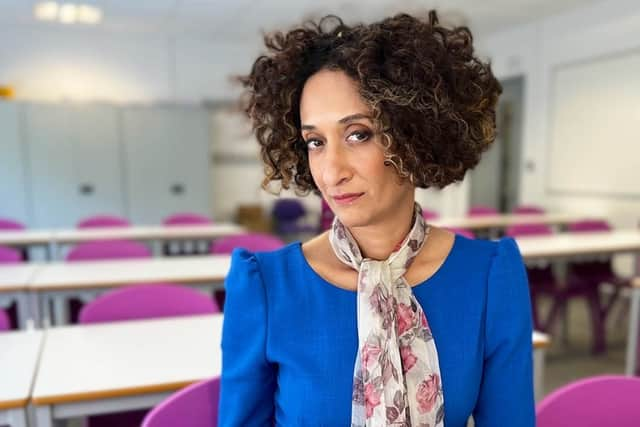Who is Katharine Birbalsingh? Social mobility tsar, where she went to university and what she said in speech
and live on Freeview channel 276
Working class students shouldn’t fixate on getting into Oxbridge but instead celebrate on “smaller steps”, according to the Government’s social mobility tsar.
Katharine Birbalsingh used her inaugural speech as chair of the Social Mobility Commission to argue that the UK needs a radical shift in how it views social mobility, where too often it has been defined as a caretaker’s daughter going to Oxbridge, for example.
Advertisement
Hide AdAdvertisement
Hide AdAnd she said social mobility should not focus only on “rags-to-riches”, as well as arguing that widening access to university hasn’t always helped.
But who is Katharine Birbalsingh, where did she go to university and what’s been said about social mobility?


Who is Katharine Birbalsingh?
She is a teacher and education reformer who set up the high-achieving Michaela Community School in Brent.
Born in New Zealand, she was raised in Canada until her father began teaching at the University of Warwick. She became interested in teaching when studying French and philosophy at New College, Oxford.
Advertisement
Hide AdAdvertisement
Hide AdShe began a blog, To Miss With Love in 2007 under the name of Miss Snuffy. She went on to give support to the Conservative Party’s education policies and reforms made by Michael Gove while he was education secretary.
In October 2021 she was appointed chair of the Social Mobility Commission.
She is known for making controversial comments. In April, she was urged to apologise for telling a Government committee that girls did not take up A-level physics because they disliked “hard maths”, and she has championed strict approaches to discipline such as silent corridors in schools and a campaign against mobile phones for toddlers.
Birbalsingh also featured in the documentaryBritain’s Strictest Headmistress on ITV which looks at her work at the Michaela Community School, often described as the “strictest school in Britain”. Among the rules the pupils have to follow are silence in the corridors.
Advertisement
Hide AdAdvertisement
Hide AdWhat’s been said about social mobility?
In her inaugural speech as chairwoman of the Social Mobility Commission (SMC), said society needed to move away from a model of social mobility where there is a “focus on big-leap-upward mobility from the bottom to the top in one generation”.
She said there was a “definite levelling up aspect” to Dick Whittington’s mobility, growing up in Lancashire and having to “leave for London to make his dreams come true”, while social mobility should be understood more broadly in terms of “smaller steps” up the ladder.
“If he was born in Lancashire today, his route to an elite profession might still take him along the same geographical route from the North to London.
“Instead of a picnic and a cat, he would now need to take with him some brilliant educational credentials and then find his way through the door of an elite professional company to make his way in life,” Ms Birbalsingh said.
Advertisement
Hide AdAdvertisement
Hide AdThe “unforeseen consequence” of the Dick Whittington narrative, which chronicles a “leave to achieve” approach, is that it makes things worse for the people and places left behind, she said.
Ms Birbalsingh said society needed to find a new way of framing social mobility.
“If a child of parents who were long-term unemployed, or who never worked, gets a good job in their local area, isn’t that a success worth celebrating?” she said.
Ms Birbalsingh told the PA news agency that the commission could not predict whether social mobility would stagnate as a result of the cost-of-living crisis, but that the SMC was interested in “long-term trends”.
Advertisement
Hide AdAdvertisement
Hide AdMs Birbalsingh said: “For my top 5%-6% of children at school I’m really excited for them to be able to possibly get into Oxford or Cambridge.
“But I just recognise that for the majority of my children that isn’t really a reality, and that we’re too often distracted by that romantic Hollywood-type film of you’ve been born at the bottom and now you’re at the top and so on.
“When in fact most of us don’t actually even want to be prime minister and we don’t want to be millionaires – what we want is to be able to find a job where we can find purpose and fulfil our talents.”
She said this was not about dampening aspiration for working-class pupils.
Advertisement
Hide AdAdvertisement
Hide Ad“I don’t dampen it at our school, most certainly. But it’s also the case that it’s important to remember that not all of us want to be bankers.
“We need to value a whole variety of different careers that are out there and options for young people.
“And valuing their talents, because not everybody is going to get top 9s in their GCSEs, not everyone is going to go on and do A-levels, and to then take the sort of condescending view of people who don’t do A-levels is wrong, because they are fulfilling their talents and doing something that’s got equal worth.”
Comment Guidelines
National World encourages reader discussion on our stories. User feedback, insights and back-and-forth exchanges add a rich layer of context to reporting. Please review our Community Guidelines before commenting.
